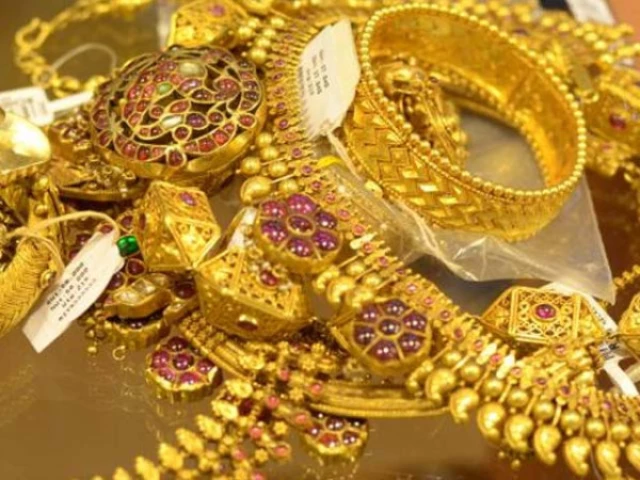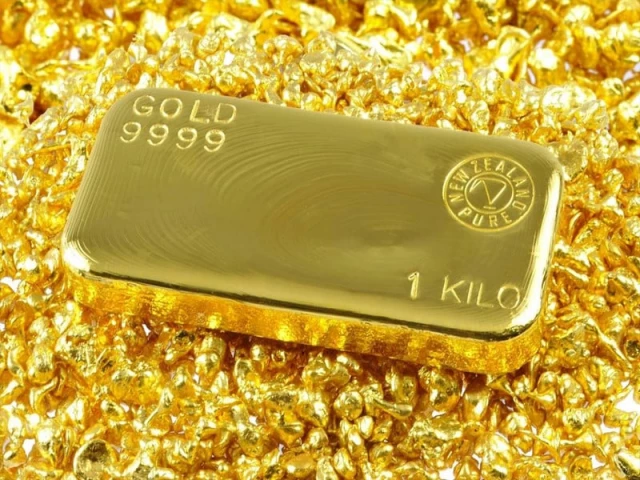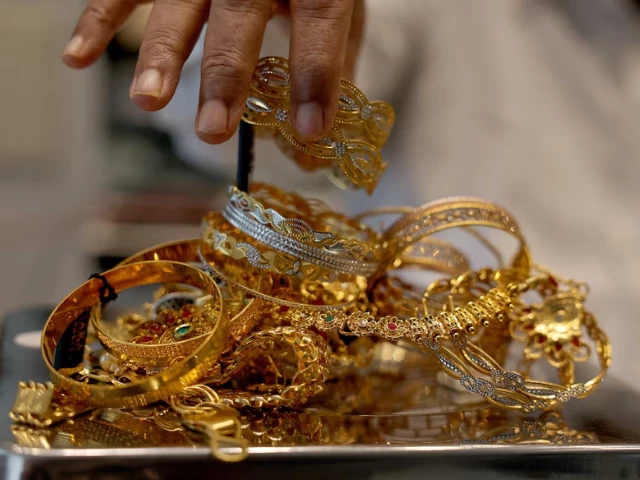Business
Gold prices in Pakistan Today – September 16, 2025 | The Express Tribune
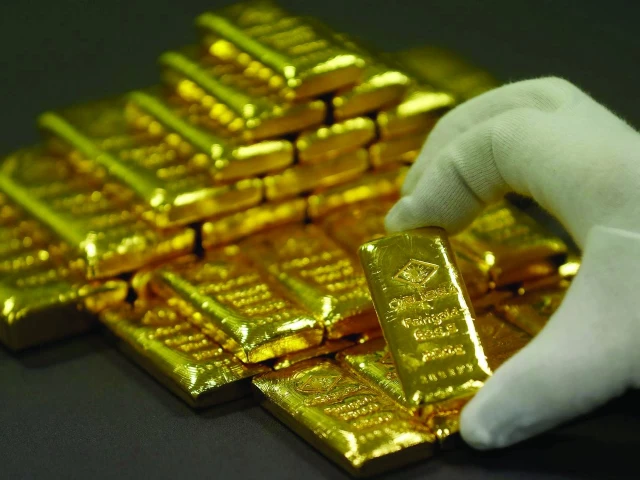
Gold prices climbed to fresh record highs in global and domestic markets on Tuesday, tracking strong gains in the international bullion trade.
International gold rose by $49 per ounce to a new peak of $3,692.
Following the global rally, the price of gold in Pakistan increased by Rs4,700 per tola to a record Rs391,000. The rate for 10 grams also jumped by Rs4,030 to reach Rs335,219.
Spot gold rose 0.2% to $3,685.02 per ounce, as of 0632 GMT, after hitting a record high of $3,689.27 earlier in the session. US gold futures for December delivery rose 0.1% to $3,722.70.
Elsewhere, spot silver was steady at $42.73 per ounce, platinum eased 0.2% to $1,398.84 and palladium fell 0.2% t0 $1,182.25.
Read: Gold holds steady ahead of Federal Reserve decision
Earlier on Monday, Gold prices remained unchanged, holding near record highs, as global investors awaited a key US Federal Reserve policy decision later this week.
According to the All Pakistan Sarafa Gems and Jewellers Association (APSGJA), the price of gold per tola stood firm at Rs386,300, while 10 grams held steady at Rs331,189.
In the international market, gold was quoted at $3,643 per ounce (including a $20 premium). Silver also traded flat, with the per-tola rate unchanged at Rs4,443.
Business
Tariff jitters: US consumer confidence slips in December; inflation and jobs worries deepen – The Times of India

US consumer confidence weakened in December, sliding to its lowest level since President Donald Trump rolled out sweeping tariffs earlier this year, as households grew more anxious about high prices, trade levies and job prospects, according to a survey by the Conference Board.The Conference Board said its consumer confidence index fell 3.8 points to 89.1 in December from an upwardly revised 92.9 in November, AP reported. The reading is close to the 85.7 level recorded in April, when the Trump administration introduced import taxes on key US trading partners, AP reported.Consumers’ assessment of current economic conditions saw a sharper drop. The present situation index fell 9.5 points to 116.8, reflecting growing unease about inflation and employment conditions. Write-in responses to the survey showed that prices and inflation remained the biggest concern for consumers, alongside tariffs.Short-term expectations for income, business conditions and the labour market were little changed at 70.7, but remained well below 80 — a threshold that can signal a recession ahead. This was the 11th straight month that expectations stayed under that level.Perceptions of the job market also weakened. The share of consumers who said jobs were “plentiful” fell to 26.7% in December from 28.2% in November, while those who said jobs were “hard to get” rose to 20.8% from 20.1%.The softer sentiment follows recent labour market data showing mixed signals. Government figures released last week showed the US economy added 64,000 jobs in November after losing 105,000 jobs in October. The unemployment rate climbed to 4.6% last month, its highest level since 2021.Economists say the labour market is stuck in a “low hire, low fire” phase, as companies remain cautious amid uncertainty over tariffs and the lingering effects of high interest rates. Since March, average monthly job creation has slowed to about 35,000, down from 71,000 in the year ended March. Federal Reserve chair Jerome Powell has said he suspects those figures could be revised even lower, AP reported.
Business
US economy grows at fastest pace in two years
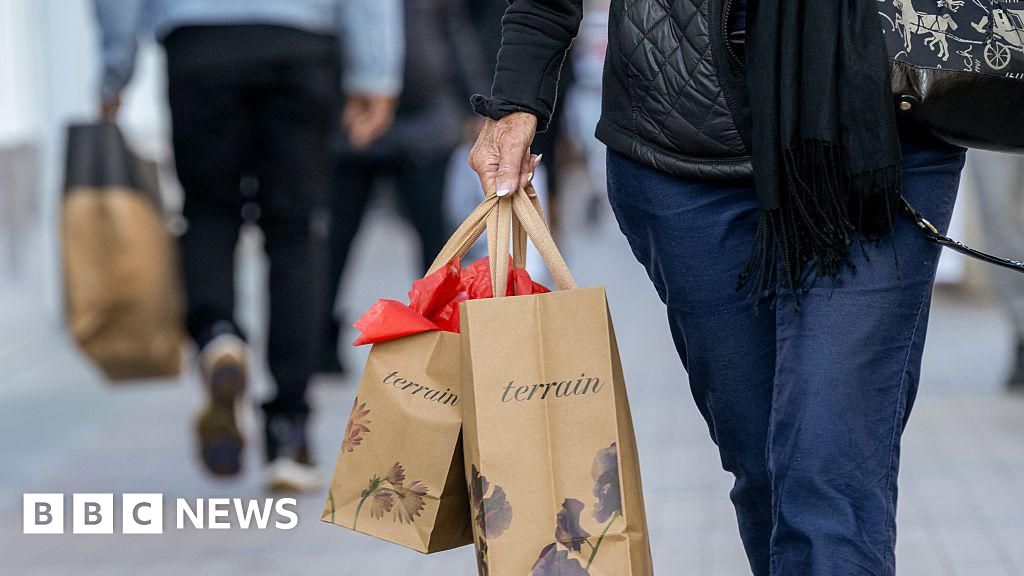
The US economy picked up speed over the three months to September, as consumer spending jumped and exports increased.
The world’s largest economy expanded at an annual rate of 4.3%, up from 3.8% in the previous quarter. That was better than expected, and marked the strongest growth in two years.
The figures offer a clearer picture of the state of the US economy heading into the end of the year, after data collection had been delayed by the US government shutdown.
The report showed consumer spending rising by 3.5%, compared with 2.5% in the previous quarter.
Business
Fish and chip shop offers 100 free Christmas meals in Southampton

“It’s just a way of us giving back to the community,” says a fish and chip shop owner, who is giving away 100 free meals on Christmas Eve.
Raj Khaira, from Southampton, has owned Top Catch fish and chips in Shirley for five years and says he wants to support lonely people in the area.
He says he feels lucky to have a big family but knows for some customers a conversation with a shopkeeper might be the only one they have some days.
He says the shop will give portions of sausage and chips to those in need as a way of “giving back to the people who haven’t got family around them and sometimes can’t afford a hot meal”.
Mr Khaira speaks about working in business all of his life and how much he enjoys meeting “different people every day, from different backgrounds”.
“I’ve done it since I was a young kid so it’s all I really know,” he says.
He adds that many of his customers are elderly and do not have connections over the festive period.
“Christmas for majority of us is probably going to be a joyful and busy day but for some people it’s probably going to be a quiet day,” he says.
After posting about the plans to donate on social media he received a lot of publicity and Mr Khaira is prepared to “probably do more than” 100 meals.
He says the shop has already organised a toy and present drop off to Southampton hospitals this December, with many of the donations coming from customers.
He says: “We’re only where we are as a busy shop because of our community and our lovely customers that come in and sometimes you’ve got to give back and I’m happy to do that.”
Looking back on some of the negative news reported in Shirley earlier this year with the rise in anti-social behaviour in the area, he admits he had suffered.
His shop window was smashed in the summer, but he says: “Christmas time lets us just try and forget that for a minute and just try and have a good time, and reflect back on the year and hopefully next year is going to be a better one.”
-

 Business1 week ago
Business1 week agoStudying Abroad Is Costly, But Not Impossible: Experts On Smarter Financial Planning
-

 Fashion5 days ago
Fashion5 days agoIndonesia’s thrift surge fuels waste and textile industry woes
-
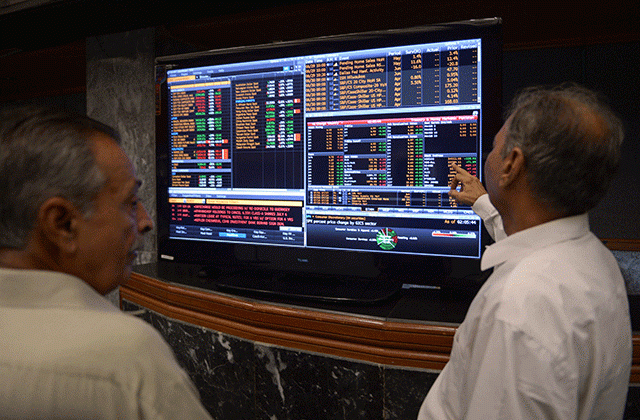
 Business1 week ago
Business1 week agoKSE-100 index gains 876 points amid cut in policy rate | The Express Tribune
-

 Sports1 week ago
Sports1 week agoJets defensive lineman rips NFL officials after ejection vs Jaguars
-

 Business5 days ago
Business5 days agoBP names new boss as current CEO leaves after less than two years
-

 Tech5 days ago
Tech5 days agoT-Mobile Business Internet and Phone Deals
-

 Entertainment1 week ago
Entertainment1 week agoPrince Harry, Meghan Markle’s 2025 Christmas card: A shift in strategy
-

 Sports5 days ago
Sports5 days agoPKF summons meeting after Pakistani player represents India in kabaddi tournament



